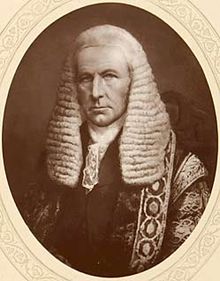
Speaker Denison's rule is a constitutional convention established by John Evelyn Denison, who was Speaker of the British House of Commons from 1857 to 1872, regarding how the Speaker decides on their casting vote in the event of a tie in the number of votes cast in a division.
In 1867, when a tie arose on a motion on Fellowships at Trinity College, Dublin, Denison gave his casting vote against the motion, declaring that any decision must be approved by the majority. The rule as subsequently adopted is that the Speaker, in any division upon a bill, should vote to leave a bill in its existing form.[1]
The principle is always to vote in favour of further debate, or, where it has been previously decided to have no further debate or in some specific instances, to vote in favour of the status quo.[2][3] Thus, the Speaker will vote:
- against the final reading of a bill (and against holding such readings immediately rather than in the future, to allow for time to consider the matter)
- in favour of earlier readings of bills (and in favour of holding such readings immediately rather than in the future, to allow for further debate)
- against amendments to bills
- against motions of no confidence
- in favour of disagreeing with amendments made by the House of Lords
The thinking behind the rule is that change should only occur if an actual majority vote is in favour of the change.
Speaker Denison's rule is now a guiding principle in many other bodies that have neutral chairpersons.[4]
- ^ Cite error: The named reference
Boothroydwas invoked but never defined (see the help page). - ^ MacDonagh, Michael (1914). The Speaker of the House. London: Methuen. p. 74.
- ^ Factsheet P9: Divisions (PDF). London: House of Commons Information Office. 2010. p. 6. Archived (PDF) from the original on 27 July 2020. Retrieved 11 May 2010.
- ^ "Exercise of the Casting Vote of the Chair". Parliament of New South Wales. Archived from the original on 15 June 2016.
